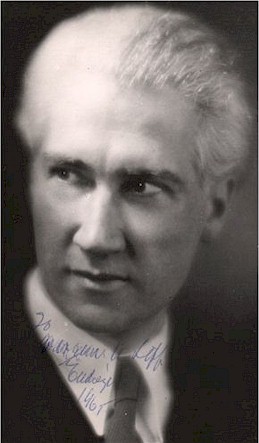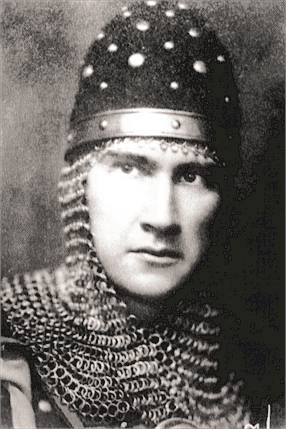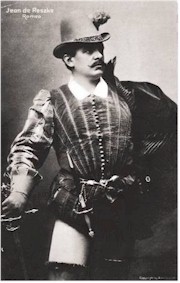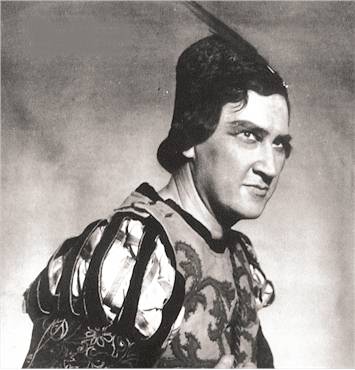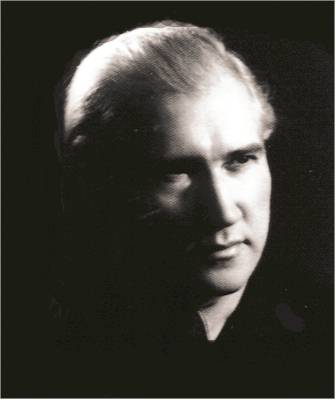American baritone, 1893 - 1975
(by courtesy of Charles B. Mintzer) Biographical notes:
He was born Arthur Endres Kraeckmann in Chicago (his paternal grandfather was German, his maternal grandfather French). While he worked on a farm and studied agriculture in college, the
conductor Walter Damrosch discovered his beautiful voice and recommended him to study singing. It was not until 1928 when he came to France by way of the American Academy at
Fontainebleau. While there, he took instruction from Jean de Reszke and began a career as a recitalist. He made his opera debut in 1925 as Don Giovanni at the Nice Opera House. It was the
composer and baritone Reynaldo Hahn, who invited Endrèze to appear in some opera performances at Cannes and Dauville. He debuted as Karnack in Lalo’s Le Roi d’Ys at the
Opéra-Comique in 1928, followed by the first appearance at the Grand Opéra as Valentin, where he created a variety of roles of French contemporary operas: The most successful creation were
the title role in Magnard’s Guercoeur, and the baritone roles in Sauguet’s La Chartreuse de Parme, Milhaud’s Maximilien, Bachelet’s Un Jardin sur l’Oronte and Milhaud’s Medée. His
additional repertory included The High Priest in Samson et Dalila, Athanaël in Thaïs, Hérode in Hérodiade, Hamlet, Iago, Pollux in Rameau’s Castor et Pollux, Count of Nevers in Les Huguenots,
Capulet and later Mercutio in Roméo et Juliette, Nilakantha, Albert, Karnac in Le Roi d’Ys, Sharpless, Scarpia, Germont-père, Valentin, Telramund, Kurwenal, Rigoletto and Amonasro. In
1937 he took part in the first performance of Honegger/Ibert’s L’Aiglon. In 1932 he appeared as Creon in Alfano’s L’Ultimo Lord and in Delmet’s L’Escarpolette. Endrèze was the leading baritone
at the Grand Opéra for almost 20 years. After internment by the Germans during the German occupation in France, he was allowed (as a native American) to return to the United States. After
War he returned to France (he was married to a French pianist with whom he gave many recitals) and enjoyed a remarkable success in the title-role of Méhul’s Joseph. During his entire career he
was also a frequent guest at the operas of Nice, Brussels and Monte Carlo (he never appeared in the United States). After more than 50 years in France, he returned to the United States in
1948 to work as a singing coach, but decided to go back to France after two years. The last two years of his life he lived in Chicago.
As Telramund, wearing Jean de Reszke’s Lohengrin costume!
Jean de Reszke (Polish-French tenor, 1850 - 1925) The greatest French tenor of the later part of the 19th century, in fact the greatest French singer of his day, was Arthur Endrèze’s teacher for three years. De Reszke began as a baritone and restudied as a tenor. His first appearance as a tenor in 1879 was by no means a success. He decided to retire for five years (!) and made a triumphant reappearance as Jean in Massenet’s Hérodiade in 1884. This was the beginning of a truly great career in Europe, Russia and the United States. The only surviving souvenirs of Jean de Reszke’s greatness are a few minutes captured by Lionel Mapleson in his last Met season.
As Iago Comment: Arthur Endrèze and Jean de Reszke were not French by birth, but “we should remember that
vocal style is the product of cultural identification, not the accident of birth - a baby born in a stable is not a horse,” as Michael Scott explained.
Endrèze found his artistic temperament destined for the serious and tragic incarnations. He never appeared in Mozart and Rossini (except Don Giovanni). Mercutio’s ballad, which is
splendidly sung, tell us that he was able to sing “lighthearted” parts as well. There is neither roundness nor brilliance in his voice (as we know from Italian baritones), but his
is a warm and highly individual instrument of a velvety quality in the upper register. Particularly in the lyrical parts, you can hear his perfect mezza voce and his great ability to sing with inner emotion
. He articulates each phrase with a feeling for the particular color that helps to illuminate its meaning. Endrèze had a perfect French pronounciation (all the more remarkable for a native
American) and, when listening to him, you will know what French diction is about. His Hérode, Hamlet and Athanaël - not to forget his song recordings - are wonderful examples of French
singing art. Arthur Endrèze is a favorite baritone of mine because of his entirely personal and sensual approach to music.
|
||||||||||||||||||||||||||||
